Ace CUET Political Science: Key Topics, Smart Strategies & Scoring Tips!
Want to score high in CUET Political Science? 📘 This guide covers everything — from NCERT-based syllabus highlights and key theories to smart preparation hacks and real-world examples. Learn how to master topics like Indian democracy, globalization, and world politics with simple strategies, mind maps, and mock tests. Perfect for CUET aspirants aiming for top ranks in Political Science and related fields! 🎯✨
CUET
10/11/20253 min read


CUET POLITICAL SCIENCE: KEY TOPICS & PREPARATION STRATEGIES
Political Science is one of the most popular and high-scoring subjects in the CUET (Common University Entrance Test). It tests a student’s understanding of political concepts, democratic structures, and global political developments. For students aspiring to pursue degrees in Political Science, International Relations, or Public Administration, mastering this subject can greatly improve their CUET scores and overall percentile. This blog will walk you through the CUET Political Science syllabus, key topics, preparation strategies, and smart tips to score well in the exam.
Understanding CUET Political Science
The Political Science section in CUET is designed to test both conceptual clarity and factual knowledge. It includes topics from Class 12 NCERT textbooks and evaluates a student’s analytical and interpretative skills. The exam typically follows an MCQ format, where each question tests your understanding of the Indian political system, constitution, governance, and contemporary world politics.
CUET Political Science Syllabus Overview
The syllabus can be divided into two broad parts based on NCERT books — Contemporary World Politics and Politics in India Since Independence.
Politics in India Since Independence
This section deals with how India evolved as a democratic nation after 1947. Key topics include challenges of nation-building, era of one-party dominance and the rise of regional parties, democratic movements and social changes, politics of liberalization and globalization, Indian foreign policy and its evolution, and coalition governments and political alliances. Focus on understanding major political events, policy decisions, and leaders’ contributions such as Jawaharlal Nehru, Indira Gandhi, and Atal Bihari Vajpayee.
Contemporary World Politics
This part covers international relations and global developments after World War II. Key areas include the Cold War and its impact on global politics, Non-Aligned Movement (NAM) and India’s role, disintegration of the USSR and unipolar world order, globalization, environment, and international organizations (like UN, WTO, IMF), South Asian and Middle Eastern conflicts, and global security and terrorism. This section tests your awareness of international events, geopolitical shifts, and India’s global stance. Reading current affairs alongside these topics helps strengthen your answers.
Key Political Theories and Concepts to Master
To do well, you must also understand key terms and theories often tested through application-based questions such as democracy and its types, secularism and socialism, federalism and separation of powers, human rights and equality, electoral reforms and political participation, global governance and diplomacy. These concepts help in analytical questions where you must apply theory to practical examples.
Preparation Strategies for CUET Political Science
Let’s break down an effective preparation approach step by step.
Start with NCERTs
The Class 12 Political Science NCERT textbooks — Contemporary World Politics and Politics in India Since Independence — are your foundation. Read them line by line. Every year, a majority of CUET questions are directly based on NCERT concepts and examples. Make summary notes for each chapter with keywords, events, and important dates.
Focus on Chronology
Many questions test your understanding of the sequence of political events. Example: “Arrange the following events in chronological order – (a) Green Revolution, (b) Emergency, (c) 1977 Elections, (d) Mandal Commission.” Creating timelines helps in remembering the order of key reforms, policies, and movements.
Stay Updated with Current Affairs
CUET often includes questions that link textbook concepts with current political events. Example: India’s foreign policy shift, environmental summits, or global conflicts. Read newspapers like The Hindu or Indian Express, and follow monthly current affairs compilations to stay updated.
Practice PYQs and Mock Tests
Solving Previous Year Questions (PYQs) gives a clear idea of question trends and difficulty levels. Take mock tests weekly to improve speed and accuracy. After every test, analyze your mistakes and revise weak topics. This is essential for time-bound exams like CUET, where accuracy matters as much as knowledge.
Make Mind Maps and Flashcards
For topics like Cold War, Indian elections, or globalization, mind maps help visualize connections. Flashcards with important terms (like “hegemony,” “coalition,” or “non-alignment”) make last-minute revision faster and more effective.
Integrate Concepts with Real Examples
Whenever you study a topic, try connecting it to real-world examples. For instance: Coalition Politics → UPA and NDA governments; Federalism → Centre-state relations and GST policy; Globalization → Role of technology and MNCs. This makes your understanding deeper and helps you recall information in application-based questions.
Smart Tips for Scoring High
Revise NCERT summaries weekly. Highlight definitions and thinkers’ names. Prepare a one-page “concept sheet” for each chapter. Focus on keywords like democracy, secularism, globalization, and coalition politics. Stay calm and confident during the test — logical reading helps in eliminating wrong options.
Conclusion
Political Science in CUET is not just about memorizing facts — it’s about understanding how systems, policies, and ideologies shape societies. With the right preparation strategy, even complex topics like globalization or coalition politics become simple and interesting. By mastering key chapters, revising regularly, and linking theory with real-world examples, students can easily score high in CUET Political Science and strengthen their foundation for future law, humanities, or public policy programs.
At ResultPrep Coaching, we guide students through concept-based learning, practice tests, and time management strategies to help them excel in CUET and beyond.
📞 Call: 8970007497
🌐 Visit: www.resultprep.com
Prepare for the best results!
Achieve your goals with expert coaching and support from ResultPrep.
Contact us:
© 2025. All rights reserved.
Address:
GSS Complex, 2nd Floor,
16th Cross Rd, HMT Layout, Vidyaranyapura, Bengaluru, Karnataka- 560097
